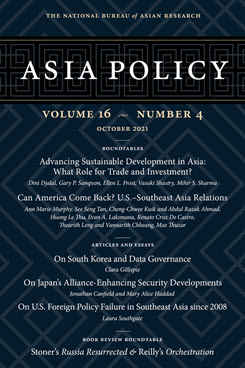The New Geopolitics of Trade and Investment in Asia
Multilateralism, Regionalism, Protectionism, or All of the Above?
This essay analyzes the impact of recent geopolitical trends on Asia’s regional trade and investment order, highlights the rival strategies pursued by China and Japan, and draws some conclusions about the future role of the U.S.
This roundtable was made possible by the generous support of the Hinrich Foundation.
EXECUTIVE SUMMARY
MAIN ARGUMENT
The geopolitical foundations supporting Asia’s rapid economic growth are weaker than they were at the turn of the millennium. The security environment has deteriorated sharply. Many of the tariffs erected by the Trump administration against imports from China, as well as from allies and friendly countries, are still in place. The most striking feature of the new trade and investment landscape is the emergence of rival regionalisms forged by China and Japan. As they navigate these contrasting initiatives, Asian governments, particularly in Southeast Asia, are exercising new agency and are not likely to relinquish it just because the U.S. claims to be “back.” This combination means that the future of Asia’s economic order is likely to be a mixture of selective multilateralism, regionalism, and protectionism.
POLICY IMPLICATIONS
- Japan has become the de facto leader of the emerging economic order in Asia, while China has amassed enormous regional influence. As trade and economic negotiations proceed, the U.S. will have a seat at the table but will no longer sit at the head.
- The fastest and most direct way for the U.S. to re-enter the leadership circle would be to join the Comprehensive and Progressive Agreement for Trans-Pacific Partnership (CPTPP). The Biden administration should slowly and quietly build the case in Congress and with the public for making such a move after the 2022 midterm elections.
- The Biden administration should ensure that “foreign policy for the middle class” does not lead to new trade barriers against other nations, especially allies and friends. Selective removal of existing barriers would help restore goodwill. U.S. negotiators should adopt a style of engagement that emphasizes listening to other countries’ concerns.
Ellen L. Frost is a Senior Advisor and Fellow at the East-West Center (United States).
About Asia Policy
Asia Policy is a peer-reviewed scholarly journal presenting policy-relevant academic research on the Asia-Pacific that draws clear and concise conclusions useful to today’s policymakers. Asia Policy is published quarterly in January, April, July, and October and accepts submissions on a rolling basis. Learn more


